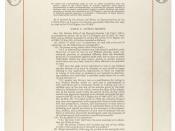There's been a great deal of debate about sexual harassment over the last few years. Much of it has been debate springing from a firm base of ignorance. The debate has also centered on what people think sexual harassment law may be, without regard to what it really is. So, to give everyone (who doesn't already know) a firmer base than ignorance, a quick primer on the law of sexual harassment under Title VII of the Civil Rights Act.
Sexual Harassment comes in two forms -- "quid pro quo" and "hostile working environment." The former is pretty straight- forward: "sleep with me or you're fired." Essentially, "quid pro quo" harassment involves making conditions of employment (hiring, promotion, retention, etc.) contingent on the victim's providing sexual favors. Very few people have a problem with this, and I'm not going to spend too much time on it unless someone has questions.
Hostile working environment
"Hostile Working Environment" harassment is the one people are really arguing about.
So what is it?
According to the American Justice a hostile working environment is "When the workplace is permeated with 'discriminatory intimidation, ridicule, and insult,' that is 'sufficiently severe or pervasive to alter the conditions of the victim's employment and create an abusive working environment,' Title VII is violated."
Conduct that is not severe enough to create an OBJECTIVELY hostile or abusive work environment -- an environment that a REASONABLE PERSON would find hostile or abusive -- is beyond Title VII's scope. Like- wise, if the victim does not subjectively perceive the environment to be abusive, the conduct has not actually altered the conditions of the victim's employment, and there is no Title VII violation.
"Whether an environment is 'hostile' or 'abusive' can be determined only by looking at all the circumstances. These may include [a]...


